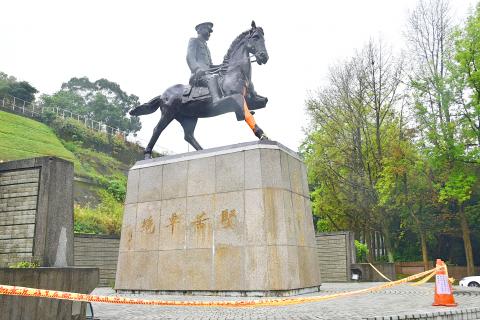National Chengchi University (NCCU) yesterday said that it would demand compensation from National Taiwan University student Hsu Che-jung (許哲榮) and his accomplices for vandalizing a statue of Chiang Kai-shek (蔣介石) on its campus.
The statue of Chiang sitting on a horse is near the rear exit of the university.
Hsu and his accomplices early yesterday morning allegedly severed one of the horse’s legs.

Photo: Wu Po-hsuan, Taipei Times
It was an attempt to remove all symbols of authoritarianism from NCCU’s campus, Hsu said.
Thursday next week is 228 Peace Memorial Day, but the university has yet to take responsibility for the role it played during the White Terror era, he said.
Everyone in the system, including the military and police, were Chiang’s accomplices, propping up his “dictatorship,” Hsu said, adding that he targeted the statue because he considered the horse to be representative of those who helped Chiang.
“By our actions, we hope to dissolve the authoritarianism of the Chiang era from its roots and encourage Taiwanese to face their history ... while increasing the chance of dialogue,” Hsu said.
The university’s decision to seek compensation was the “worst choice” during this period of transitional justice, he said.
“The dictator created many symbols so that his status of authority could live on,” Hsu said, adding that he was sorry there are still people who defend authoritarian rule.
NCCU welcomes democratic and varied ways of expressing opinions, but would press charges against those responsible and demand compensation, university secretary-general Ho Lai-chieh (何賴傑) said.
Freedom of expression is a constitutionally guaranteed right, but NCCU does not condone violence as a form of expression, Ho said.
NCCU had previously discussed the issue and decided to preserve the statue, Ho said, adding that it has no immediate plans to change that decision.
Student groups from the two universities, as well as other youth groups, said that more attention should be paid to transitional justice, while calling for a free and independent Taiwan.
Students should act to remove the remaining vestiges of authoritarian rule and reinforce Taiwan’s democracy, the groups said.
Separately, the Transitional Justice Commission said that while it understood young people’s opinions and actions, it was nonetheless sorry to hear of Hsu’s actions.
The commission said that it encouraged faculty and students to resolve their differences through the democratic channels available at NCCU.
Additional reporting by Lee Hsin-fang

MAKING WAVES: China’s maritime militia could become a nontraditional threat in war, clogging up shipping lanes to prevent US or Japanese intervention, a report said About 1,900 Chinese ships flying flags of convenience and fishing vessels that participated in China’s military exercises around Taiwan last month and in January have been listed for monitoring, Coast Guard Administration (CGA) Deputy Director-General Hsieh Ching-chin (謝慶欽) said yesterday. Following amendments to the Commercial Port Act (商港法) and the Law of Ships (船舶法) last month, the CGA can designate possible berthing areas or deny ports of call for vessels suspected of loitering around areas where undersea cables can be accessed, Oceans Affairs Council Minister Kuan Bi-ling (管碧玲) said. The list of suspected ships, originally 300, had risen to about 1,900 as

Japan’s strategic alliance with the US would collapse if Tokyo were to turn away from a conflict in Taiwan, Japanese Prime Minister Sanae Takaichi said yesterday, but distanced herself from previous comments that suggested a possible military response in such an event. Takaichi expressed her latest views on a nationally broadcast TV program late on Monday, where an opposition party leader criticized her for igniting tensions with China with the earlier remarks. Ties between Japan and China have sunk to the worst level in years after Takaichi said in November that a hypothetical Chinese attack on Taiwan could bring about a Japanese

MORE RESPONSIBILITY: Draftees would be expected to fight alongside professional soldiers, likely requiring the transformation of some training brigades into combat units The armed forces are to start incorporating new conscripts into combined arms brigades this year to enhance combat readiness, the Executive Yuan’s latest policy report said. The new policy would affect Taiwanese men entering the military for their compulsory service, which was extended to one year under reforms by then-president Tsai Ing-wen (蔡英文) in 2022. The conscripts would be trained to operate machine guns, uncrewed aerial vehicles, anti-tank guided missile launchers and Stinger air defense systems, the report said, adding that the basic training would be lengthened to eight weeks. After basic training, conscripts would be sorted into infantry battalions that would take

Right-wing political scientist Laura Fernandez on Sunday won Costa Rica’s presidential election by a landslide, after promising to crack down on rising violence linked to the cocaine trade. Fernandez’s nearest rival, economist Alvaro Ramos, conceded defeat as results showed the ruling party far exceeding the threshold of 40 percent needed to avoid a runoff. With 94 percent of polling stations counted, the political heir of outgoing Costa Rican President Rodrigo Chaves had captured 48.3 percent of the vote compared with Ramos’ 33.4 percent, the Supreme Electoral Tribunal said. As soon as the first results were announced, members of Fernandez’s Sovereign People’s Party